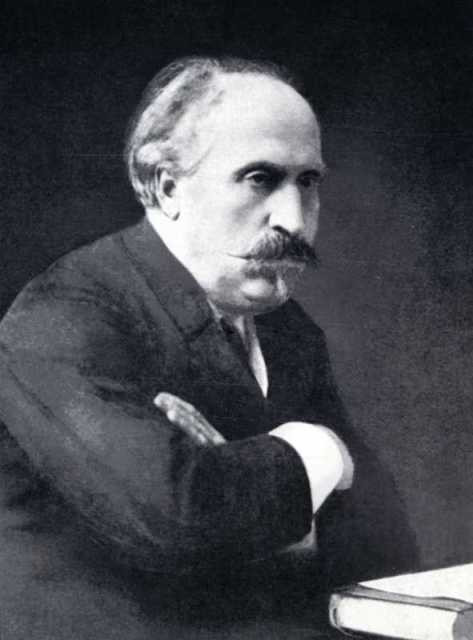
Andrejs Jurjāns
(30.09.1856 - 22.09.1922 )
"Jurjāns earned his position in music history long ago. He was the gallant knight who awakened our half-asleep, dreaming lovely maiden – our song. He opened our eyes so that we could see the tasks posed by our national music, and he was engaged with this up till his last living breath. He left us an inheritance that has given us fruit a hundredfold, and will continue to do so a thousandfold. He was led by a single thought, a single deity: his songful fatherland Latvia."
Jāzeps Vītols
"Such men as Andrejs Jurjāns and Emīls Dārziņš leave the following generations with a legacy against which to measure your attitude towards art, how to view art and what to ask of oneself and others."
Alfrēds Kalniņš
Andrejs Jurjāns, the first Latvian professional composer and classicist of Latvian music, was born on September 30, 1856, in the homestead of Meņģeļi in the town of Ērgļi. He was one of nine children in his family. In 1875 he was accepted at the St. Petersburg Conservatory; he and the pianist Ludvigs Bētiņs were the first Latvian students to enroll there. He graduated with three diplomas, completing his studies in the organ class of Louis Homilius in 1880, the composition class of Nikolai Rimsky-Korsakov in 1881, and the French horn class of Friedrich Homilius in 1882, winning the grand silver medal. During the last years of his studies, he conducted the choir of the St. Petersburg Latvian Charitable Society, and he was actively engaged in various other cultural activities in St. Petersburg. From 1882 to 1916, Andrejs Jurjāns taught music theory, French horn, and choral conducting at the Harkov Imperial Russian Music Society’s music school. He wrote critiques for the newspaper Južnij Kraj, conducted the Harkov Latvian Choir, played the horn in the Harkov Symphony Orchestra, and occasionally gave concerts of organ music. During the first years of the 20th century, he was afflicted by a serious illness of the ears, and as his hearing deteriorated, he was forced to retire from teaching music in 1916.
In 1920 he returned to Latvia, devastated by the premature death of his only son and by the loss of his hearing. He died on September 28, 1922. Andrejs Jurjāns became a powerful personality owing to his environment – a nationally patriotic family and friendship with the most important Latvian cultural exponents of the time – combined with his remarkable diligence and ambition. The wide scope of his interests and work is surprising; he was an innovator in many fields.
Jurjāns the composer represented the romanticism of 19th-century Europe that was linked with national schools, patriotic themes and folk music. His musical style was shaped by Russian musical traditions and German romanticism, as well as a deep influence by Latvian folk music. Jurjāns composed the first Latvian symphonic works, among them the first instrumental concerto and the first cantata, showing a command of the symphony orchestra. Compared to the music of his predecessors, Jurjāns elevated the genre of a cappella choir song to a higher level of quality, enriching it with fresh thematic material and bright imagery. His output in the genres of instrumental music and solo songs is perhaps of lesser significance; nonetheless, here one can find new currents as well. It is noteworthy that Latvian folk songs permeate all of Jurjāns’ works, not only in the form of arrangements; most of his original compositions contain quotations of Latvian folk songs or melodies resembling them. A particularly important sphere in his output is found in his Latvian folk song arrangements for choir, which represent a major step forward in comparison to the works of his predecessors. In them he has demanded of himself no less than in his original compositions, while maintaining a reverent faithfulness to the essential qualities of the folk tunes (among them diatonicism, asymmetrical phrase structure, and mixed meters). He has sought to underscore the unique content and expressive nature of each folk song with appropriate musical devices.
Jurjāns is also the founder of Latvian musicology – he was the first person that systematically collected, studied, and classified Latvian folk music, writing analytical commentary about it. Along with some faithful assistants, he collected approximately 6000 examples of folklore – melodies, texts, games, dances, and other rituals – among them are some 3000 folk melodies from all of the regions of Latvia. His work was compiled in the six volumes of Latvju tautas mūzikas materiāli (Materials of Latvian Folk Music), the last volume of which was published posthumously.
Nowadays Andrejs Jurjāns is remembered as the founder of the Latvian national school in music, paving the way for further development in Latvian professional music, and providing fertile ground for the creative growth of his successors Jāzeps Vītols, Alfrēds Kalniņš, Emīls Dārziņš, and others. His efforts in collecting, studying, and arranging Latvian folk songs were continued by Emilis Melngailis and Jēkabs Graubiņš. While Jurjāns’ contributions occupy an important place in the history of Latvian culture, his works continue to be meaningful and relevant in present-day Latvian cultural life.
Mārīte Dombrovska Translation - Imants Mežaraups, Egils Kaljo © LMIC
